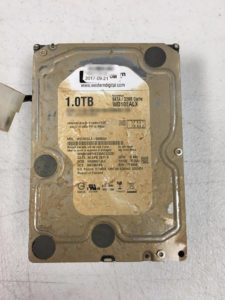
A hard drive with severe flood damage.
It’s a common misconception that electronics and water don’t mix — in fact, they mix extremely well. That’s precisely why you don’t want to get your computer wet.
But if you need to recover from a water-damaged hard drive, solid-state drive (SSD), or any other data storage device, you should never attempt to dry the device. This might sound counterintuitive: Water is bad, so dry is good, right?
Not quite. While water can cause shorts when electronics are operating, corrosion is a much more serious threat.
Why Water Is Bad for Storage Media
Corrosion is the result of the oxidation of metal surfaces. Oxidation — as the name implies — occurs when metals lose electrons to oxygen. As the oxygen gains electrons, it forms an oxide with the metal.
This reaction can occur quickly. If you try to dry a hard drive with hot air (for instance, from a blow dryer), corrosion will probably take hold before the hard drive is completely dry.
And in most cases, water isn’t pure. If your computer was damaged in a flood, corrosion isn’t your only concern: Contaminants from dirty flood water can wreak havoc on the drive’s electronics.
If data isn’t extremely important, you can try to use isopropyl alcohol to dry the device.
To be clear, you should only dry your device with isopropyl alcohol if you do not plan on pursuing professional data recovery. Generally speaking, you only have one chance to recover your data — if your recovery attempt fails, the chances of successful file retrieval drop.
Isopropyl alcohol is often used to remove flux residue from around soldering points, and it’s a common tool in data recovery laboratories. It’s also effective for treating water damage, provided that the damage is only from water exposure.
Some quick tips:
- Only use alcohol with a 95% purity grade or higher. 99% isopropyl alcohol is recommended.
- A common tactic is to submerge the device in alcohol. This is not recommended for hard drives — as we’ve discussed in other blogs, hard drives are not airtight. Gently clean the external components with alcohol and allow the drive to dry for several hours before attempting to use it.
- Work quickly. The longer you wait to treat a water-damaged device, the higher the chances of corrosion.
If data is important, get immediate assistance from a data recovery provider.
Water can damage electronics, but until extensive corrosion occurs, the data should be recoverable. To optimize your chances of recovery, follow these steps:
- Seal the drive in a plastic bag or an antistatic bag.
- Do not attempt to dry the drive — but don’t add water, either. Adding clean water could lead to additional issues.
- Make a list of the target files for the data recovery attempt.
- Contact a professional data recovery provider. Ensure that the provider operates laboratories equipped to handle water-damaged media.
If you’ve lost data due to a fire, a flood, or for any other reason, we’re here to help. Datarecovery.com provides risk-free evaluations, and we support all of our services with our no data, no charge guarantee.
To get started, call 1-800-237-4200 or set up a case online.





